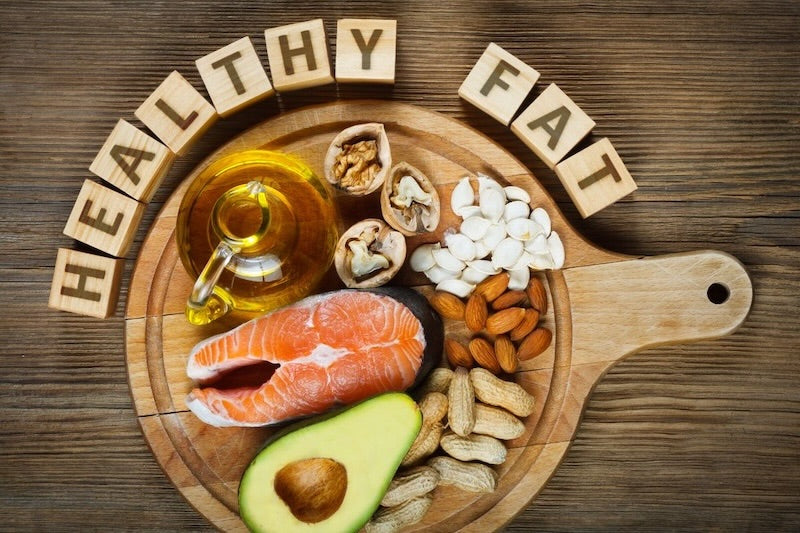For decades, dietary fat was demonized in the health world. From government food pyramids to mass-marketed "low-fat" products, the consensus was clear: fat was the enemy. But as modern science continues to evolve, a powerful truth is emerging—not only is fat not harmful, but it is also essential for energy, endurance, hormonal health, and optimal brain function. Especially when sourced from nutrient-dense, animal-based foods, fat is not just a source of calories; it's the body's preferred, long-burning fuel.
The Myth of Low-Fat Diets
Low-fat diets gained popularity in the 1980s and '90s under the misguided assumption that dietary fat caused obesity and heart disease. In reality, removing fat from the diet didn't make people leaner or healthier. Instead, food manufacturers replaced fats with sugars and refined carbohydrates—triggering a new wave of insulin resistance, obesity, and chronic disease.
As Dr. Robert Lustig points out in Fat Chance:
“First, a low fat diet tastes like cardboard; the flavor is in the fat. So you up the carbs to compensate, increasing your insulin, and your weight.”
He goes on to explain the nuanced role of LDL ("bad cholesterol") and the oversimplified vilification of saturated fats:
“Large buoyant (type A) LDL has a neutral impact and by itself poses little risk for heart disease. Conversely, small dense (type B) LDL, which accounts for the other 20%, is driven by dietary carbohydrates. It is type B that contributes to heart disease.”
The takeaway: It's not dietary fat that's fueling chronic disease—it's refined carbs and seed oils.

Why Fat is the Superior Fuel
From an energy standpoint, fat provides more than twice the calories per gram compared to protein or carbohydrates. But the value of fat goes far beyond calorie density.
1. Long-Lasting Energy
Fat is the body’s most efficient and sustainable energy source, especially for endurance activities. Unlike carbohydrates, which cause insulin spikes and crash quickly, fat metabolism offers a slow, steady burn. This is why athletes in ultra-endurance events often turn to high-fat, low-carb ketogenic diets to enhance performance and reduce the need for frequent refueling.
2. Hormonal Health
Fat, particularly saturated fat and cholesterol, is the raw material for hormone production. As Dr. Paul Saladino notes in The Carnivore Code:
"The cholesterol molecule is also used as a precursor for all of the steroid hormones in our body. These include estrogen, testosterone, cortisol, progesterone, and aldosterone."
Cutting fat out of the diet compromises hormonal balance, libido, recovery, and mood regulation. Animal fats, rich in cholesterol and saturated fatty acids, are uniquely effective in supporting the endocrine system.
3. Brain Function and Mental Clarity
The human brain is over 60% fat by dry weight and depends on fatty acids for structure and function. Essential fatty acids like DHA are critical to memory, mood, and focus. Dr. Saladino writes:
"Omega-3 fatty acids are especially enriched in our brains, with DHA making 90% of this lipid pool. Deficiencies have been associated with depression, memory and attention deficits, fatigue, and infertility."
And it’s not just omega-3s—carnitine, a fat-metabolism molecule, has been shown to improve mitochondrial function in the brain and alleviate depressive symptoms in both humans and animals.
The Role of Saturated Fat
Saturated fats have been wrongly demonized for years, but emerging research is challenging that narrative.
"We've been eating animal foods with saturated fat in them for the entirety of our evolution as humans... High-fat ketogenic diets containing plenty of saturated fat reverse diabetes and insulin resistance. They also lead to weight loss and improvements in inflammatory markers..."
This statement from The Carnivore Code aligns with studies showing that saturated fat improves HDL ("good cholesterol"), reduces inflammation, and supports gut integrity. Unlike processed vegetable oils, saturated fats do not damage the gut lining or promote leaky gut syndrome.

The Problem with Trans Fats and Processed Oils
While natural animal fats have many benefits, artificial trans fats and industrial seed oils wreak havoc on the body. Dr. Lustig again highlights the issue:
“Trans fats. These can’t be broken down by the mitochondria because of their synthetic nature... Trans fats used to be in every processed food... they are a significant factor in the etiology of metabolic syndrome.”
These synthetic fats disrupt mitochondrial function, increase oxidative stress, and play a major role in heart disease, insulin resistance, and inflammation.
Cholesterol: Misunderstood but Essential
For years, we’ve been told that dietary cholesterol raises blood cholesterol and causes heart disease. But this simplistic view ignores the complexity of lipid metabolism.
"Our body makes around 1200 mg of cholesterol every day for many important purposes, including the proper formation of all our cell membranes... and as a precursor for steroid hormones."
Cholesterol isn’t something to be feared—it’s something to be nourished. In fact, low cholesterol can be far more dangerous than high cholesterol when it comes to hormone production, immune function, and brain health.
Dr. Saladino goes further:
"LDL also serves important roles within the immune system... LDL binds up toxins released by bacteria and plays a valuable part in our response to infectious invaders."
LDL isn’t inherently dangerous. It only becomes problematic in states of chronic inflammation and insulin resistance, when it gets "stuck" in artery walls and oxidized. Context is everything.
Ketogenic Diets and Metabolic Flexibility
A fat-based metabolism is the foundation of ketogenic diets, which rely on fat and ketones instead of glucose for energy. The benefits of this metabolic state are well-documented:
-Improved insulin sensitivity
-Reduced inflammation
-Enhanced cognitive function
-Increased mitochondrial density
-Appetite regulation and fat loss
"Ketogenic diets can decrease appetite, lead to profound weight loss, improve mood, and be protective for our brain... From a cardiovascular risk standpoint, a ketogenic diet has also been shown to decrease triglycerides and metabolic dyslipidemia while increasing HDL."
Unlike low-fat, high-carb diets that spike blood sugar and hunger, high-fat diets are naturally satiating and allow for steady energy throughout the day.

Protein for Recovery and Strength
While fat is a powerful fuel, protein plays a complementary role in muscle maintenance, recovery, and immune function. Animal-based proteins are particularly rich in bioavailable amino acids, B12, zinc, iron, creatine, and other essential nutrients.
Top Animal-Based Protein Sources:
-Grass-fed beef
-Pasture-raised eggs
-Wild-caught salmon and sardines
-Organ meats (liver, heart, kidney)
-Raw dairy
Plant-Based Protein Options:
-Lentils
-Chickpeas
-Quinoa
-Tempeh
-Spirulina
Clean, protein bars on-the-go:
-E3 Energy Cubes (both animal and plant based)
-Prima (animal-based)
-Macrobars (plant-based)
While plant-based proteins can be part of a healthy diet, they often lack complete amino acid profiles and are less bioavailable. This means your body must work harder to extract what it needs. If you're relying on plant-based proteins, it's essential to combine sources and watch for nutrient deficiencies (especially B12, iron, and omega-3s).
Fat, Endurance, and Athletic Performance
One of the most powerful arguments for fat as the ultimate fuel is how it supports physical performance, particularly in endurance sports. When fat-adapted, athletes can tap into vast reserves of body fat for energy rather than relying solely on stored glycogen, which depletes quickly.
Endurance athletes who train on low-carb, high-fat diets report:
-Fewer bonks or energy crashes
-Reduced reliance on sugary gels and drinks
-Better mental clarity during long efforts
-Improved body composition
By teaching the body to become metabolically flexible, these athletes can shift between fat and carbohydrate metabolism depending on intensity and need.

Conclusion: Fat is Not the Enemy—It’s the Answer
Fat, especially from animal sources, is not just compatible with health—it's essential to it. Whether you’re focused on longevity, performance, mental clarity, or hormone balance, dietary fat offers unmatched benefits.
And as science catches up with common sense, it’s becoming clearer than ever: nature didn’t make a mistake. The foods we’ve eaten for thousands of years—animal fats, eggs, organs, and nutrient-dense meat—are precisely what our bodies are designed to run on.
So the next time someone asks, "Isn't fat bad for you?" you can confidently reply:
**"No. Fat is fuel. Real, powerful, ancestral fuel."
References:
-Dr. Robert Lustig, Fat Chance
-Dr. Paul Saladino, The Carnivore Code
-Studies on ketogenic diets, saturated fats, and omega-3s from peer-reviewed journals (PubMed, NIH)
If you're curious about incorporating more fat-based, animal-sourced foods into your lifestyle, check out Hunghee Energy—crafted with organic grass-fed ghee, raw honey, and ancient sea salt. Designed to fuel your adventures, naturally.
Hunghee Ancestral Energy is grounded in primal nutrition—packed with the most bioavailable animal-based nutrients and fueled by fat for performance, clarity, and adventure. Whether you're chasing peaks, hitting the gym, or just managing the chaos of everyday life, Hunghee's 1oz on-the-go packs deliver clean-burning, fat-fueled energy rooted in evolutionary wisdom. Made with organic grass-fed ghee, local raw honey, and ancient sea salt, Hunghee is fuel the way nature intended.
Disclaimer: This content is for informational purposes only and is not intended as medical advice. Please consult your healthcare provider for advice about a specific medical condition or before starting any new fitness or nutritional program.

